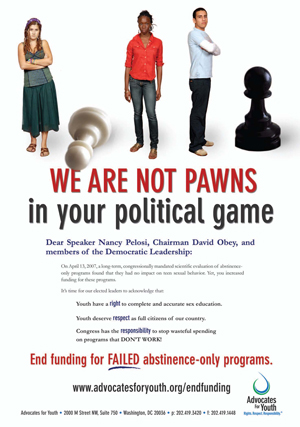
Yesterday, The New York Times ran a great op-ed about the recent debate in Congress over federal funding for the State Children’s Health Insurance Program (S-CHIP) and abstinence-only-until-marriage programs. As you probably already know, President Bush vetoed the expanded S-CHIP program claiming that in its new form, S-CHIP was one step away from socialized medicine. In an attempt to override his veto, Democrats in Congress proposed a compromise whereby funding for abstinence-only-until-marriage programs would reach new heights in an attempt to garner Republican support for the S-CHIP override.The author of The New York Times piece makes a compelling argument that the compromise “will leave millions of young Americans vulnerable to sickness and suffering of the most preventable kind.” Knowing that sex before marriage has been the norm for decades (93 percent of American adults had had premarital sex by the age of 30), she points out that funding abstinence-only programs that teach teens that sexual activity outside of marriage is likely to cause psychological and physical harm doesn’t make much sense. But it is not just that abstinence-only programs are out of step with reality, they are ineffective and dangerous:
Programs in public schools teach patently false information like ‘the chances of getting pregnant with a condom are one out of six’ and H.I.V. ‘may be in your body for a long time (from a few months to as long as 10 years or more) before it can be detected.’ The results are tragic. The United States has the highest teenage pregnancy rate in the developed world (about the same as Ukraine’s), and the highest abortion rate in the Western world. Sexually transmitted infections like syphilis and gonorrhea are on the rise for the first time since the 1980s, and chlamydia is being diagnosed twice as often as it was a decade ago.
Of course this is nothing new. Time and time again we have heard the problems with these programs. What really struck me was the connection she made to the harm these programs pose to low-income people:
Among Americans living in poverty — those who might see the $4 price of a three-pack of condoms as the take-home pay for an hour of work at minimum wage — the unintended pregnancy rate has increased 30 percent since 1994.
The poverty connection is not something I often see explored, and I wonder if anyone out there has more information/research on it.The Los Angeles Times had its own take on the inability to de-funded abstinence-only programs despite a Democratically controlled Congress. The article focuses on Representative David Obey (D-Wis.), the Chairman of the House Appropriations Committee, who has offered the programs funding support in order to “steer his panel away from the highly charged terrain of moral issues.” According to the article:
[B]y increasing funding for [abstinence-only-until-marriage] programs, he is also making a political calculation that he can pick up some Republican support for much bigger health and social welfare programs that the White House wants to cut.
Obey’s efforts, however, leave longtime opponents (both inside and outside of Congress) feeling abandoned. Representative Henry Waxman (D-Cal.) who authored reports that shed light on the problems with abstinence-only programs has been unable to turn the political shift in Congress into a loss for the programs. James Wagnor, President of Advocates for Youth, is quoted saying:
The Democrats, and most notably Henry Waxman, used the abstinence-only issue as the cornerstone of the claim that the Bush administration was putting ideology and politics ahead of science…. Now they suddenly have gone mute and silent when their own people are in power. There is an element of political hypocrisy here.
In response to the lack of political will by Democrats to defund abstinence-only programs Advocates for Youth ran an ad in Roll Call this week.Meanwhile things are just as busy at the state level. On Wednesday, a school district in Portland, Maine, approved a measure allowing middle-school students to gain access to prescription birth control medications without notifying parents. Parents must consent to a student using the in-school health center but do not know, unless the student tells them, what services are provided. Unsurprisingly, this has kicked up quite the media storm, but keep in mind, that the decision to provide students with birth control came after the school district saw 17 pregnancies over the last four years among middle school students.A columnist at The Detroit Free Press uses the school board decision in Maine to examine what is happening in Michigan.
In Michigan a 2006 law prohibits the dispensing of any kind of birth control, including condoms, on school property…. Michigan’s law makes us among the most conservative states in the union when it comes to sexual health care for kids….Our 87 school health centers — most in what she called “high risk” areas like metro Detroit — not only can’t prescribe pills but can’t even offer condoms.
But not all states are following Michigan’s lead. Just yesterday, New York City Schools Chancellor Joel Klein announced the creation of the Office of Fitness and Health Education which is set to introduce new Health education initiatives including comprehensive sex education.So there you have it. Another busy week in the fight to help teens prevent unintended pregnancy and STDs.



